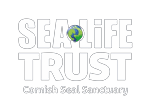Beavers at the Sanctuary

Welcome to the Secret Creek Beaver Project!
Did you know the Cornish Seal Sanctuary is part of a collaborative rehabilitation project with the Beaver Trust? Our project is all about supporting the trust’s vital work to protect this incredible species, and make sure they have a future here in the UK for generations to come.
Why are beavers important?
Wild beavers had been living in Great Britain more than 400 years ago before going extinct. They were mainly hunted for their fur and glandular oil (secreted from the base of their tail), which was thought to contain medicinal properties.
However, beavers are known as a ‘keystone species’, which makes them an important part of the natural environment. This is because their natural behaviour has a big impact on our landscape and wildlife. By damming waterways, beavers pool water, slowing the flow in rivers and streams. This water floods an area, creating new wetland and attracting wildlife, providing a home and water source for many species.

So, where does the Cornish Seal Sanctuary fit in?
The Beaver Trust are licensed to undertake translocations of beavers to new areas as part of the species’ wider restoration. This is important because some beavers are being pushed out of areas for ecological or environmental reasons. With the support of the Beaver Trust, they can move to safer areas that will allow them to thrive.
Here at the Sanctuary, our first collaboration with the Beaver Trust saw the re-homing of three beaver kits (baby beavers called Hamish, Scruff and Maple) who had been orphaned, and three adults (Barbara, Norbert and Twiggy). We provided a temporary home where they could learn to be beavers in a comfortable and safe woodland, before they were successfully moved onto other rewilding programmes.
Today, the Sanctuary continues to support the Beaver Trust, providing a nursery for beaver kits and a larger woodland area for growing beavers to find their feet in the wild.

How we got started…
As wildlife conservation is at the heart of all the Sanctuary’s efforts, we paired up with various conservation groups across the country to decide on the best use of the large woodland area at the Sanctuary. We knew beavers would make an excellent addition to the Sanctuary, providing them with the perfect habitat and in return opening doors to research to further study their impact on the environment.
To do this, what was formerly an otter enclosure was repurposed to create a new ‘Beaver Nursery’, where the team could monitor the behaviour and eating habits of our first beavers as they settled in.
Once they reached a good healthy weight (and had the capability of building lodges and dams), they moved to their brand-new home in the large 5 km2 wooded area behind the Beaver Nursery to live a natural beaver life.
Research and projects
Following the success of our first beaver rehabilitations, which saw our initial kits and adult beavers move onto new homes, we continue to plan various research projects to understand more about beaver behaviour in the wild and how they impact the environment they inhabit (they may even be able to help in the battle against climate change!).
The projects mainly focus on monitoring water pollution and impact of damming, biodiversity counts, landscape changes and public perception on beaver rewilding which in return will generate educational content to share with guests visiting the Seal Sanctuary.
In the meantime, guests strolling through Secret Creek can learn more about this secretive species with our educational signage and see the land changes for themselves. Who knows? You may even catch a glimpse of the latest recruits hard at work!
Finally, a huge thank you to our partners…
The Secret Creek project at the Cornish Seal Sanctuary would never be possible without the help and support of other organisations, including funding from the Postcode Local Trust. From licensing, rescue, transport and care for these beavers, it has been a journey for all.
With that in mind, a huge thank you to Natural England, as well as the Beaver Trust, Chris Jones (farmer and Director of Restoration) and Dr Roisin Campbell- Palmer (beaver ecologist and practitioner) and her colleague Robert Needham, who were invaluable support throughout the whole project development, sharing information and advice on how to successfully managed beaver reintroduction. Also, a thank you to; Five Sister Zoo (West Calder) and Derek Gow Consultancy.
Photo credit: Jack Hicks
